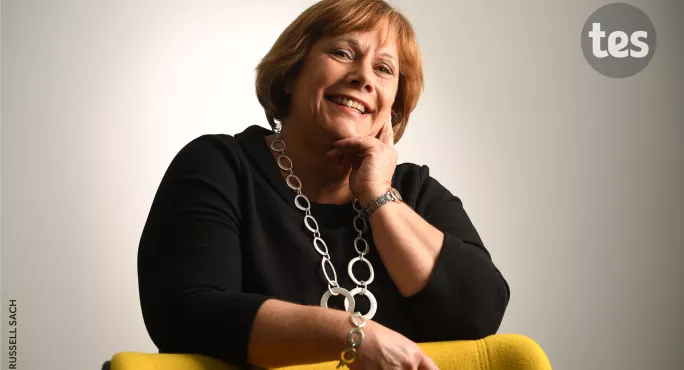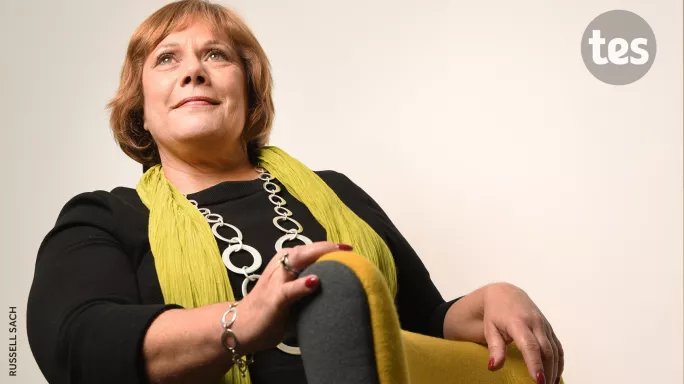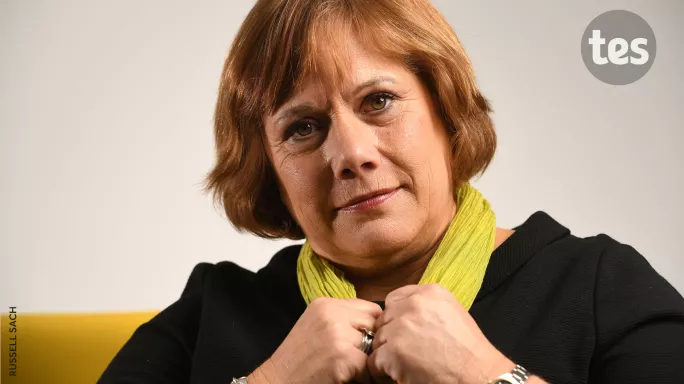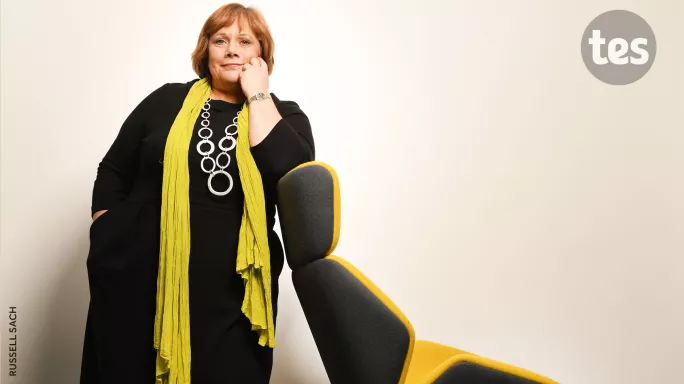- Home
- ‘A fresh pair of eyes’: The private schools inspector
‘A fresh pair of eyes’: The private schools inspector

Kate Richards’ career at the Independent Schools Inspectorate, and indeed in the independent schools sector, started with an unexpected invitation.
“I got a phone call when I was on holiday saying that they were looking for somebody to join [the ISI] - was I interested?” the chief inspector recalls.
And was she? At that particular moment, no, not really.
“I was in my shorts and T-shirt on my way to the beach,” Richards laughs. “As I remember, I just asked them to call me back.”
She had been doing consultancy work for a few years - working with academy chains, for a national charity, and governors, among others - and had worked for her whole life in the state sector. She says she wasn’t really looking for a new job.
But they called again. The watchdog - which inspects the country’s most prestigious independent schools - was looking for someone with a range of different experiences, Richards thinks.
“A pair of fresh eyes,” she says. “That’s what I had.”
Editorial: Should private schools breathe a sigh of relief?
Background: Ofsted ‘needs more access’ to private school inspections
Poll: Two-thirds of public support independent education
She thought that a new challenge, and new sector, “would be fun”.
And so Richards joined the ISI in September 2016, first as head of inspection performance, then as acting chief inspector in January 2017. Later that year, she was appointed chief inspector.
Was this her dream job when she was a teenager? No, she thought she’d go into business. But one element was already clear: she loved being surrounded by children.
“I always gravitated towards summer jobs and holiday jobs which involved children. I was babysitting from a young age,” she says.
“Then I worked at English language colleges, and I was a children’s courier overseas for a while. I probably thought that it’d be going into business, even though everything I did was centred around children.”
But the certainty of what she wanted to do came only a few years later - in the middle of a trekking trip in Nepal, during one of several trips abroad.
The travelling teacher
After sixth form at her local comprehensive, Ryeish Green School, near Reading, Richards read French and German at the University of Exeter.
“After that I did what many people do and had a gap year. I backpacked in India,” Richards says.

She started off working in a boarding school in Darjeeling, then she trekked to the Everest Base Camp, and spent the rest of the time travelling around India on her own.
Even then, she says, most of her photos include children.
“Street children, children in places I was visiting, children on buses…people would always end up putting them on my lap!” she recounts.
During her travels she met a French man, fell in love, and moved to her next destination: Paris.
There, she taught English as a foreign language to adults for a while. The couple went travelling again together, and then eventually split up. It was during another trip that Richards came to a realisation.
“I was walking in Nepal, as I was walking one day I was thinking, ‘What makes me happy, what do I enjoy, what am I going to do for the rest of my life?’,” she says. “And it was almost a sudden realisation: actually, children are what inspire me.”
The language teacher
And so she moved back to the UK and trained as a language teacher in Leicester, before starting her new job as a French and German teacher in Belper School, in Derbyshire.
As a former language teacher, Richards has a couple of thoughts to share about one of the most controversial topics in the language classroom: grammar.
The problem, she says, is that historically the focus was just on grammar - so people knew the rules but couldn’t apply them. And then the pedagogy moved on to set phrases, phrasebooks and role-plays. But Richards thinks that there should be a mix between the two because in the language classroom, children need to be empowered to understand how language works, and to reflect on it.
“If you are learning a rule and then you are learning a set phrase, it’s boring,” she says. “If you have to think about it, work out the rule for yourself, work out how to apply it, and then develop some language from that, that’s better.
“I used to do a lot of work saying, ‘You know there’s all these words, tell me then - what’s the rule?’ And they would all work out the rules. Always. It would take a while, but they would remember that rule from then on.”

Being close to the Peak District for her first teaching job was the perfect backdrop for another hobby of Richards’: rock climbing.
“There were lots of us doing rock climbing,” she says. “It was quite common - although there were probably only two women doing it.”
She has fond memories of her time at that school, of its focus on children and children first.
“It was exceptional. I think it framed me as a teacher,” she comments.
Nevertheless, a few years later she left for what was to be her last teaching abroad experience. Not in an international school in Europe or other popular destinations: she chose Borneo, and worked in a school in the jungle for two and a half years.
She says she doesn’t want to talk about the experience, but that it taught her one fundamental truth.
“I think being out there taught me that children are children: they may speak a different language, have a different system, faith, religion, but they are children.”
That was also the thought behind Richards’ seamless transition from the state to the private sector.
“I didn’t even think about the difference [between the two sectors]. This goes right down to the fact that it’s children, and children are children, whether they are in Nepal, India, in a maintained school or independent school.
“Yes there are differences, but it’s still no matter whether your funding comes from the government or your funding comes from the parents, your job as a school is to do what you have to do to the best of your ability.”
The inspectorate
After a few years in the jungle, she felt ready to apply for jobs back in the UK, and moved back to the Midlands.
“It was quite a change,” she concedes.
“If anything, it was harder coming back than it was going. You are back to your familiar life, except plenty has moved on.”
Richards says she stopped teaching “quite a long time ago”, and that her life at the ISI means she misses the “day-to-day fun and challenge and excitement of being with young people”.
“At the same time I really value the chance that I have now to try and make a difference to far more young people,” she says. “What I can do is inspect rigorously so that schools are held to account fairly and appropriately, and so that children get a balanced education, and are safe.”

Asked what she does on a typical day, she laughs. Too much to tell.
“It can vary from quite strategic development thinking about the big picture and where we need to go, to supporting my deputies in terms of specific issues that are cropping up in specific inspections,” she says.
“I tend to stay out of the detail but I am there to be a sounding board and an ear.”
One of those big pictures she is now busy with is the ISI’s new school inspection framework, kicking off in the autumn of 2022 because the current framework will have come to end of its six-year cycle.
There is a significant amount of consultation with schools, with other inspectorates, research with parents, with pupils, and information gathering being undertaken on how to make the ISI “future proof”, she says.
And how about her relationship with the state school counterpart?
In 2018, only a year after Richards took the helm at ISI, HM chief inspector Amanda Spielman called for Ofsted to have increased access to allow it to monitor independent school inspections. In her letter to the then education secretary Damian Hinds, Ms Spielman said that in the past three years Ofsted had only been able to monitor two inspections carried by the ISI, which has inspected as many as 415 schools in a single year.
Asked to comment on Ofsted’s increased monitoring, Richards will only say: “The monitoring over time has never ever thrown up any significant issues which has concerned the Department for Education.
“We welcome and welcomed the work with Ofsted over the years, the monitoring, and always take account of what they say and their views,” she maintains.
Asked if she gets along with Spielman, Richards says the relationship is “positive”. And the two inspectorates are working ever more closely together, she explains.
“Not because Ofsted wants to be ISI or ISI wants to be Ofsted - because we need to listen to each other and we are in a professional space that we can talk about issues,” she explains.
Richards is clear she has no plans of moving on from the ISI. With such a varied life story, it’s almost difficult to imagine her sitting still in one place. But maybe the travelling teacher has found a permanent home.
Kate Richards’ CV
- 2017- present Independent Schools Inspectorate, chief inspector
- 2016-17 Independent Schools Inspectorate, head of inspection performance
- 2011-16 Enrich Education: whole school reviews; coaching; headteacher appraisals; training; governance; associate SLT; inspection; pupil premium reviews
- 2002-11 Nottinghamshire LA consultant and school improvement adviser; associate SLT
- 1989-2002 MFL teacher and leader in UK and Borneo
- 1986-88 Travelling and working in Europe, South East Asia and Australia
Education
- 2011-14 SERCO/ NPQSI Liverpool Hope University
- 1994-2005 University of Bath, MA educational management
- 1988-89 University of Leicester, PGCE MFL/TESOL
- 1982-86 University of Exeter, BA joint honours French, German
Memberships
- Fellow of Chartered College of Teaching; ALL executive committee 2002-08; National Association of Language Advisers member
Keep reading for just £1 per month
You've reached your limit of free articles this month. Subscribe for £1 per month for three months and get:
- Unlimited access to all Tes magazine content
- Exclusive subscriber-only stories
- Award-winning email newsletters



